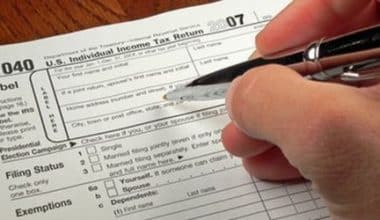Property taxes are one of the most important sources of revenue for state and local governments in the United States. These funds contribute to the funding of essential services such as public schools, infrastructure development, and public safety. However, not all states levy property taxes at the same rate. Property tax rates vary significantly across different states in the United States. This article aims to provide an overview of property taxes by state, focusing on their ranking from the highest to the lowest, including vehicle and personal taxes.
Whether you are a homeowner, real estate investor, or interested in state taxation systems, this article offers valuable information on property taxes and the factors underlying their variations among states.
10 Highest Property Taxes By State
Property taxes vary from state to state, with some states imposing higher taxes than others. In the United States, the states with the highest property taxes include:
#1. New Jersey
New Jersey consistently tops the list of the highest property taxes, with an average effective property tax rate of over 2%. This is due to the state’s high property values and the reliance on property taxes for funding local services.
#2. Illinois
Illinois is another state known for its high property taxes, with an average effective property tax rate of around 2.3%. The state faces financial challenges, and property taxes are a major source of revenue.
#3. New Hampshire
New Hampshire, as the third state with the highest property taxes, has several factors contributing to its high tax rates. The state does not have an income or sales tax, making property taxes a crucial revenue source for funding public services and infrastructure.
Additionally, New Hampshire applies its property taxes at the local level, allowing town and city governments to have considerable control over tax rates. This local control often leads to variations in tax rates across different towns and regions within the state. Despite efforts to mitigate tax burdens with various exemptions and abatements, New Hampshire’s reliance on property taxes places a burden on homeowners.
#4. Connecticut
Connecticut, as the fourth state with the highest property taxes, faces a similar situation to New Hampshire. The state’s property taxes help in financing public education and local government services. Connecticut also lacks a state sales tax on goods and services, which further increases the reliance on property taxes.
Moreover, the state has high infrastructure and healthcare costs, resulting in higher property tax rates to meet these demands. The higher tax rates in Connecticut are due to the state’s affluent population and its desire to maintain quality public services. While the local control aspect allows for variation in tax rates among different municipalities across the state.
#5. Vermont
Vermont takes the fifth spot on the list of states with the highest property taxes. Vermont’s property taxes are driven by factors such as its high property values and lack of a sales tax. Additionally, the state relies heavily on property taxes to fund local services like education and infrastructure.
As a result, homeowners in Vermont pay a significant portion of their income towards property taxes, even though the state offers some relief programs for eligible residents.
#6. Texas
Texas is another state with high property taxes. The Lone Star State has its way of calculating property taxes, primarily relying on local taxing authorities rather than the state government. The absence of an income tax in Texas means that property taxes become a more significant source of revenue for public services.
While property tax rates in Texas depend on the location, the state’s overall property tax burden remains relatively high due to some factors. This includes rising property values, increased demand for infrastructure, and funding for education and public safety. Overall, property owners in Texas should consider these factors when planning their budgets and purchasing a property.
#7. California
California, ranking at no.7 for the highest property taxes by state, has one of the highest rates due to its high property values. The state has relatively progressive tax policies, meaning that higher-valued properties are subject to higher tax rates.
In addition, California has various local taxes and assessments that further contribute to the overall property tax burden. Despite the high rates, California’s property tax system also includes certain protections, such as the famous Proposition 13, which limits increases in assessed property values to no more than 2% per year.
#8. Wisconsin
Wisconsin has a unique property tax structure. The state imposes a state and a local property tax, which can vary considerably across different municipalities. Additionally, Wisconsin has a relatively high level of property tax revenue compared to other states. This is primarily due to its reliance on property taxes to fund local government operations. This, combined with the state’s commitment to providing quality public education and infrastructure, contributes to Wisconsin’s higher property tax rates.
#9. Massachusetts
Massachusetts, the ninth state with the highest property taxes, shares some similarities with California and Wisconsin. The state has a dense population, high property values, and a strong commitment to public education and services. However, the cost of living is relatively high, especially in metropolitan areas.
#10. Ohio
Ohio also ranks among the states with the highest property taxes. Like Massachusetts, Ohio relies heavily on property taxes to fund its local government services and schools. The property tax rates in Ohio vary based on the county and city.
However, the state collects an average statewide tax rate, which adds to the property tax burden of Ohio residents. Furthermore, the cost of living and property values in certain areas of Ohio are higher, resulting in higher property tax bills.
5 Lowest Property Taxes By State
When it comes to property taxes, some states offer a more budget-friendly option for homeowners. The following have the lowest property taxes in the United States.
#1. Hawaii
First on the list is Hawaii. Despite its reputation for being an expensive place to live, Hawaii has one of the lowest property taxes in the state. The state has a homeowner exemption program, which allows residents to reduce their property taxes if they live in the property as their primary residence.
#2. Alabama
With one of the lowest property tax rates in the nation, Alabama is an attractive option for potential homeowners. The state’s property tax rates vary depending on the county, but overall, they tend to be among the lowest in the country.
In addition to the low rates, Alabama also offers a homestead exemption for qualified homeowners, allowing them to lower their property taxes even further.
#3. Wyoming
Wyoming is among the state with the lowest property taxes. With an average effective property tax rate of just 0.61%, Wyoming residents enjoy significantly lower taxes than the national average.
This allows homeowners to save money and invest it elsewhere. Additionally, Wyoming has no income tax, making it an attractive option for individuals looking to minimize their overall tax burden.
#4. Arkansas
Following closely behind Wyoming is Arkansas, with an average effective property tax rate of 0.68%. Arkansas is known for its low cost of living and this extends to property taxes.
Hence, homeowners in this state benefit from affordable or lowest property taxes, allowing them to stretch their hard-earned dollars further. This makes Arkansas appealing for retirees and individuals on fixed incomes, who want to make their savings.
#5. Colorado
Colorado also has the lowest property taxes in the state. Property taxes are at the county level in Colorado, and the average effective property tax rate is around 0.55%. This means that homeowners in Colorado pay approximately 0.55% of their property’s assessed value in taxes each year.
This relatively low rate is significantly below the national average, which hovers around 1.08%. The low property tax rates are due to the state’s strict limits on property tax increases, known as the Gallagher Amendment, as well as other tax deductions and exemptions.
Overall, these states provide a more affordable option for homeowners looking to reduce their property tax burden.
Vehicle Property Taxes By State
Vehicle property taxes vary by state in the United States. These taxes are on the vehicle and are typically on an annual basis. In some states, the rate is a percentage of the vehicle’s value, while in others, it is a fixed amount. They use the revenue from these taxes to fund local government services and infrastructure projects.
The vehicle property taxes payable can vary significantly from state to state. For example, states like Alaska, Delaware, Montana, and New Hampshire do not have any vehicle property taxes. On the other hand, Rhode Island, Connecticut, and New Jersey have higher rates, ranging from 1.32% to over 2% of the vehicle’s value.
Hence, vehicle owners should know the tax rates in their state and plan accordingly for this expense. Additionally, some states provide exemptions or credits for low-income individuals, senior citizens, or veterans, which can help to reduce the tax burden. Overall, understanding the vehicle property taxes in one’s state is essential for every vehicle owner to ensure compliance with regulations and avoid penalties or fines.
Personal Property Taxes By State
Personal property taxes vary by state in the United States, with each state having its own regulations and assessment methods. These taxes are typically on vehicles, boats, furniture, machinery, and equipment individuals own. The rates and exemptions for personal property taxes also differ by state, making it important for individuals to understand the rules and regulations in their specific jurisdiction.
For example, Texas, Florida, and Nevada have no statewide personal property tax on individuals. However, other states such as California and New York have high personal property tax rates that can impact individuals’ finances.
Additionally, some states provide exemptions or credits for certain types of personal property, such as agricultural equipment or renewable energy installations. However, understand the personal property tax regulations in your state to manage your finances and ensure compliance with the law.
Do All US States Have Property Tax?
In all 50 U.S. states, laws require most property owners to pay real estate taxes, and property taxes vary by state.
How Much Is Property Tax In Florida?
Property tax in Florida is 0.98%, slightly lower than the U.S. average of 1.08%.
Which State Has No Property Tax In USA?
There is no state without a property tax. Meanwhile, property taxes remain a significant contributor to overall state income.
How Much Is Property Tax In California?
The average effective property tax rate in California is 0.71%.
Which Country Has No Property Tax?
One country that does not have property tax is the United Arab Emirates (UAE). The UAE has no property tax on residential properties or commercial properties. This makes it an attractive destination for investors and individuals looking to purchase real estate.
Is Property Tax Paid Every Year In USA?
Yes, every year property owners pay taxes. Government levy the taxes to generate revenue for funding essential public services, such as schools, roads, police and fire departments, and other local services.
Does Texas Have Property Tax?
Yes, Texas has property tax. In other words, property taxes are an essential part of funding local government services.
Conclusion
Property taxes vary from state to state, resulting in a wide range of rankings from highest to lowest. However, the above rankings show that there is a disparity among states. While some states impose a property tax burden on residents, others offer comparatively lower rates.






